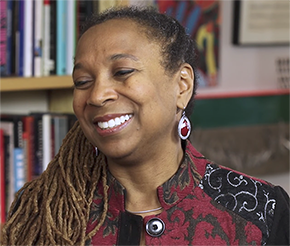Black History Month: Kimberle Crenshaw
 “Intersectionality.” The term, coined by Kimberle Crenshaw, has become a hot topic and a rallying cry for those on the front lines of the fight for human rights. With an undergraduate from Cornell, a JD from Harvard Law School, and an LLM from University of Wisconsin, she began her career at the UCLA School of Law and served as a founder of the critical race theory, a framework that proposes white supremacy and racism remain consistent and that the law may assist in keeping the status quo. The theory has expanded, by other academics and activists, into studies of internalized racism, institutionalized racism, white privilege and microaggressions. She also introduced intersectionality to the feminist movement, encouraging due consideration to be given to the law and how it overlaps in the form of race, gender, and justice. In 1994, after the Cairo Conference on Population and Development, her work on intersectionality became the foundation on which the black women attendees of the conference built their Reproductive Justice movement in the United States, where they realized race and gender relations were lagging behind. Crenshaw founded the first School for Intersectionality and Social Policy Studies at Columbia, where she is a professor, and also co-founded and serves as the executive director for a nonprofit think tank, focusing on the issues of gender and diversity. She has written informational documents for the United Nations World Conference on Racism, served on the Committee to Research Violence Against Women on the National Science Foundation, and has had prominent media background speaking on the issues of gender and race.
“Intersectionality.” The term, coined by Kimberle Crenshaw, has become a hot topic and a rallying cry for those on the front lines of the fight for human rights. With an undergraduate from Cornell, a JD from Harvard Law School, and an LLM from University of Wisconsin, she began her career at the UCLA School of Law and served as a founder of the critical race theory, a framework that proposes white supremacy and racism remain consistent and that the law may assist in keeping the status quo. The theory has expanded, by other academics and activists, into studies of internalized racism, institutionalized racism, white privilege and microaggressions. She also introduced intersectionality to the feminist movement, encouraging due consideration to be given to the law and how it overlaps in the form of race, gender, and justice. In 1994, after the Cairo Conference on Population and Development, her work on intersectionality became the foundation on which the black women attendees of the conference built their Reproductive Justice movement in the United States, where they realized race and gender relations were lagging behind. Crenshaw founded the first School for Intersectionality and Social Policy Studies at Columbia, where she is a professor, and also co-founded and serves as the executive director for a nonprofit think tank, focusing on the issues of gender and diversity. She has written informational documents for the United Nations World Conference on Racism, served on the Committee to Research Violence Against Women on the National Science Foundation, and has had prominent media background speaking on the issues of gender and race.
Crenshaw’s analysis on intersectionality has been pivotal to the movement because it has allowed for a paradigm shift in our discourse. Systems of oppression cannot be singularly analyzed; but when done cohesively, they can sufficiently address the underlying issues and how to move forward. So if we were to look at black women aged 15-44, they continue to make up the highest demographic of women obtaining abortions with 27.1/1,000 women (Guttmacher). We can think about access to contraception, socio-economic status, housing situations amongst a myriad of other aspects of black life as the reasons behind this fact. We can dig deeper and look at the demographics and ask why certain races are getting more abortions and what that says about family planning in those different communities. RHAP values the concept of intersectionality as it broadens our perspective of what it really means to fulfill our mission of making reproductive health care accessible to all.
Become a recurring, sustaining donor today, and you will receive a copy of our book “A Common Thread: Weaving reproductive health, rights and justice” featuring Kimberle Crenshaw and many other change makers in our movement!
